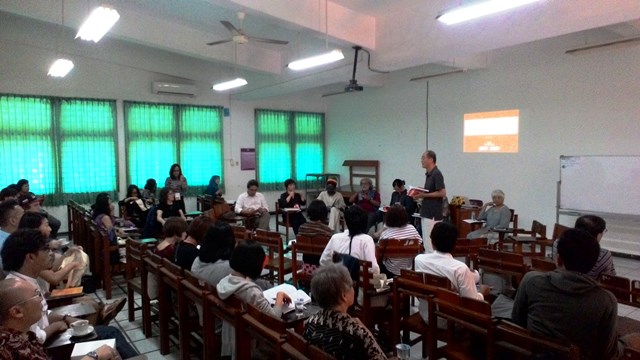
Roundtable in IACS 2015 Conference: Bandung/Third World 60 Years
(IACS 2015 會議之圓桌論壇:萬隆/第三世界六十年)
Date日期: 9 August 2015), 10.30-12.00
Venue地點: Faculty of Public Health, Airlangga University, Surabaya, Indonesia
Organizers籌辦單位: Inter-Asia Cultural Studies Society, University of Indonesia and Airlangga University
Sponsored by Inter-Asia School 亞際書院贊助
Panel Organizer 論壇籌組人: Kuan-Hsing CHEN 陳光興 (National Chiao Tung University國立交通大學, Taiwan)
Panel Presenters 與談人
1. Hilmar FARID (Institute of Social History)
2. Jahlani NIAAH (University of West Indies)
3. Tejaswini NIRANJANA (Center for the Study of Culture and Society; Tata Institute of Social Sciences)
4. PAIK Wondam (Sung Kung Hoe University)
5. Ashish RAJADHYASHA (Center for the Study of Culture and Society)
6. Noer Fauzi RACHMAN* (Sajogyo Institute for Agrarian Studies and Documentation)
7. Chiyo WAKABAYASHI (Okinawa University)
8. WANG Xiaoming* (Shanghai University)
2015 marks the 60th anniversary of the 1955 Bandung Conference. Over the past 60 years, the world has been reshaped greatly. By now, the celebrated BRICS (Brazil, Russia, India, China and South Africa) have become the driving engines of world economy; and Indonesia, where the Bandung Conference was held, is visibly on the forefront of the Southeast Asia regional economic growth. In short, ex/socialist, ex/colonized and ex/third world countries seem to have emerged as the leading edge of global capitalism. The roundtable would like to take the opportunity of the Bandung 60th to critically reflecting on the histories, the trajectories and the conditions of the world being transformed. Are these rising economies, with a revolutionary and anti-imperialist past, able to create new forms of operation to break the conquering and exploitative logics of capitalism, or simply reproducing what they were fighting against? If the complexities of the current situations demand us to move beyond an either/or understanding, what are the legacies of the Bandung and its spirits, which can be mobilized to imagine new forms of solidarity for a better world?
On a more intellectual level, we are interested in sorting out the changing conditions of knowledge production in diverse locations. Having achieved certain degree of autonomy, are we now better equipped to connect and reconnect critical circles of thought (local and regional formations growing in the past 60 years) located in the (ex) third world to forge different modes of knowledge production? How to develop different modes and systems of knowledge to account for and confront the complexity of the living world on different levels of abstraction is at the center of concern for this proposed roundtable.
2015年是1955年萬隆會議的六十周年紀念。在過去六十年間,世界已經有大幅轉變。到現在,被大為推崇的巴西、蘇俄、印度、中國和南非(所謂的「BRICS」,亦即Brazil, Russia, India, China和South Africa)儼然成了世界經濟的推進引擎。同時,萬隆會議的舉辦地,也就是印尼,則明顯站在東南亞區域經濟成長的前線。簡而言之,前/社會主義的,前/被殖民的,以及前/第三世界的國家們,似乎成了全球資本主義的前鋒。本次圓桌論壇想藉著萬隆會議滿六十周年的機會,批判地回顧世界之所以有此轉變的歷史、軌跡和條件。這些過去曾是革命的、反帝的新興經濟體是否能創造出可以打破資本主義式征服與剝削邏輯的新的操作方式,還是僅僅在再生產它們以往曾對抗的東西?如果說當前情況的複雜性要求我們提出一種超越「不是...就是」的理解方式,那麼萬隆會議和它的精神又留下了怎樣的遺緒,讓我們能夠加以調動來想像新的團結方式,創造一個更好的世界?
在較為知識的層次上,我們也希望可以釐清在各種不同地方的知識生產所面臨的種種變動中的狀況。在獲得了某種自主性的此時,我們現在是否真的更具有跟各地(前)第三世界知識圈進行連繫或重新連繫的能力,形成不同的知識生產模式?如何發展不同的知識模式和體系,以便可以在不同的抽象層次解釋和面對活生生的世界,是這次圓桌論壇的核心關切。
*(有*記號的講者為原訂參加但現場不克前往)